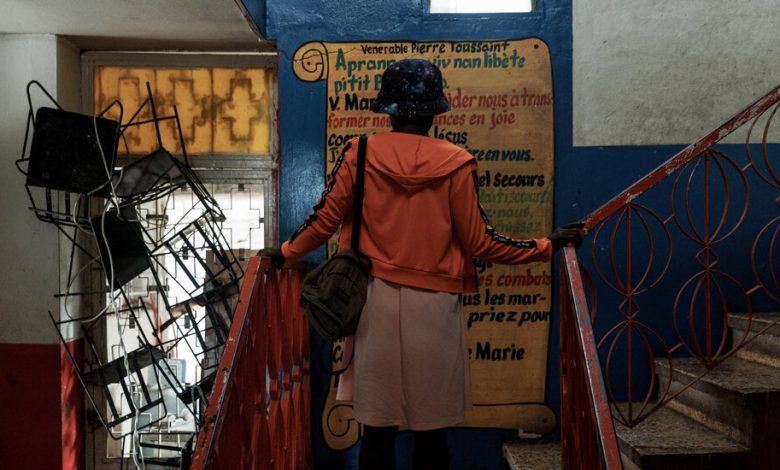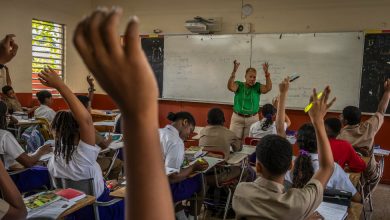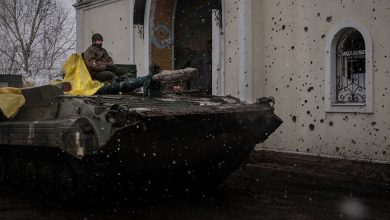‘I Lost My Heart.’ A Haitian Mother’s Fight For Her Child

It was the worst gang war Haiti had seen in years.
Criminals fighting over territory had blocked almost every escape route out of the nation’s largest slum, a sprawl of shacks and crumbling buildings in the capital. Armed men went door to door, setting fire to homes and killing residents they deemed loyal to their enemies.
But under the sheet metal roof of one house, a woman named Mamaille was hopeful.
She was raising her four children alone, after their father disappeared months earlier. Mamaille, 39, never found out whether he was killed or just fled the endless violence. Now, she had found a way to get at least one of her children out of their hellish neighborhood.
It would be dangerous, of course, but doing nothing meant living with the fear of knowing that unspeakable horror could happen at any moment. It meant walking miles to beg in front of churches to feed her family, when just leaving the house could get her killed.
The random murders, the massacres, the houses burned to the ground, the charred and mutilated corpses piling up in the sun — those nightmares were well documented. People shared photographs of the gangs’ latest victims in their WhatsApp chat groups.
Staying alive was simpler, it seemed, for the wealthy, who hired bodyguards and traveled in armored vehicles. But violence stalked them, too: Men with rifles often pulled people out of the best protected cars in broad daylight. Kidnapping for ransom has become one of the healthiest businesses in Haiti.
For Mamaille, though, poverty made escape all but impossible. During weeks of near-constant shooting, the farthest she got was to a friend’s house less than a mile away, where she briefly took her children to hide out.
Then, she heard about a plan involving an intrepid nun who she thought could save her daughter.
Mamaille’s neighborhood, Cité Soleil, is dominated by two rival gangs with spheres of control so well defined that residents can draw a precise map of the streets that divide their territories.
Armed groups have been in Haiti for decades, sustained by longstanding ties with political and economic power brokers who are said to pay off the criminals in order, for example, to keep their goods moving through the country or to mobilize or suppress votes.
In the past, the gangs put more effort into gaining the trust of the people they ruled over, experts say, portraying themselves as protectors of the population.
But that seemingly changed in recent years, as the government ceded more power than ever to armed groups that began annexing vast new territory — and carrying out kidnapping and extortion on a wide scale.
“Before, they were not as self-sufficient as they are today,” said Reginald Delva, a Haitian security consultant, referring to the country’s gangs.
“Now they are on their own. They make so much money that they aren’t taking orders from anyone,” Mr. Delva added. “There’s no barriers, there’s no limit to their actions.”
Their connections to politicians and economic elites still run deep, and the violence is often motivated by politics. Sometimes, the point is to destabilize the government; other times, it is to keep things calm by preventing people from pouring onto the streets to protest.
But more and more, gangs are fighting each other for territory across the capital — and punishing civilians they see as partial to their rivals. To assert their dominance and beat the population into submission, the armed groups have become agents of unrestrained terror.
Among their preferred weapons: rape.
Gangs use sexual violence to “humiliate, instill fear and inflict individual and collective trauma, with the ultimate purpose of expanding and consolidating their control,” the United Nations said in a report published in October.
“It’s another way of terrorizing the population,” said Sister Paesie, a nun who has opened several schools and shelters in some of the poorest areas of the capital.
In one of her facilities, the nun has taken in dozens of women and girls who were either raped or threatened by gang members. So many women have fled Cité Soleil that Sister Paesie ran out of space to house them, so she started renting homes in safer neighborhoods for rape victims.
“When the boys in the gang tell them they love them, they run for their lives,” the nun said.
One Saturday in July, Sister Paesie, whose given name is Claire Philippe, got a call from the principal at one of the schools she runs in Cité Soleil.
Word had spread that the nun was prepared to take schoolchildren out of the slum, to a safer area, and so hundreds of students had gathered at a local chapel to wait for her. Mamaille’s 17-year-old daughter, dressed in her school uniform, was among them.
But Sister Paesie never showed up — she could not even make it into the area because of the violence that was raging that day — and so Mamaille and her daughter headed home.
Just before they reached their house, automatic gunfire erupted, and Mamaille saw her daughter slump forward into the dirt.
“I saw that my daughter had been shot,” Mamaille said. “I felt the pain you feel when you give birth to a baby.”
By the time she got her daughter to a clinic, the girl was already dead, her blueskirt and yellow blouse soaked in blood.
“I lost my daughter, I lost my heart,” Mamaille said. “I lost my whole life.”
The next day, Sister Paesie made it to the edge of Mamaille’s neighborhood, and said she did eventually help evacuate hundreds of children, taking them to shelters across the city.
The nun has witnessed a lot of death and pain in Haiti. But what happened to Mamaille and her daughter, she says, has made her feel more helpless than almost anything else.
Mamaille told her story from a private room inside one of Sister Paesie’s shelters. Her last name and her daughter’s name have been withheld for her protection. She fears that gang members would kill her if they knew she was talking about their crimes.
“If you say certain things out loud, you won’t be able to go back to Cité Soleil,” Mamaille said.
After leaving her daughter’s lifeless body at the clinic, Mamaille roamed the streets screaming in anguish.
Her wails must have caught the attention of gang members lurking nearby because, suddenly, Mamaille said, a group of men with guns appeared, dragged her behind a house and raped her, one by one. There were eight of them, she said, and they beat her up before leaving.
“I would have preferred to die because when you die, it’s over, it’s finished,” Mamaille said, crying softly. “You never think about what happened to you.”
After the men left, Mamaille had no choice but to get up, walk home and somehow resume the work of surviving in Cité Soleil.
When she can get out of her neighborhood safely, Mamaille travels to one of Sister Paesie’s schools nearby to pick up some rice and cooking oil, or makes her way to churches to beg for money. She collects rainwater and mixes in a chlorine tablet to purify it enough to drink.
“Sometimes, I spend three days without being able to feed my kids and myself,” she said.
Her daughter was the one who kept her spirits up during times like this, the one who brought pails of water so she could bathe after a long day. The girl wanted to someday work in the houses of the rich, cleaning and doing laundry to support her family.
“‘Mom don’t get too tired for us,’” Mamaille recalled her daughter saying. “‘One day, I’ll help you get out of this misery. I’ll lift you up from the ground.’”
At night, when Mamaille stares up at the ceiling in her shack, she can see the sky through a rash of bullet holes that were left in her metal roof after a stretch of gang fighting last summer.
She imagines her daughter up there.
“I think her soul may be in heaven, and I start crying,” Mamaille said. “Sometimes, I fall asleep crying, without knowing it.”





